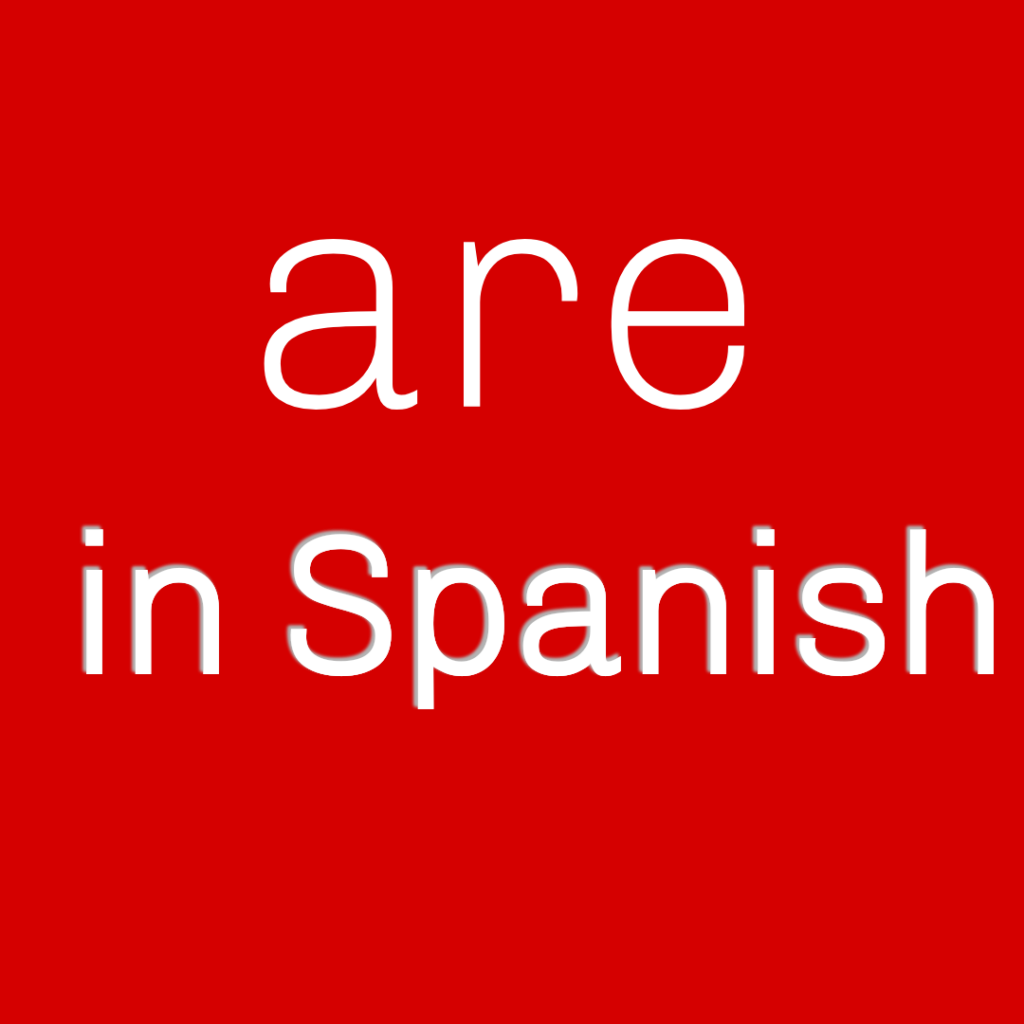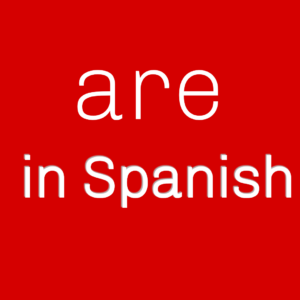
How to say are in Spanish?
¿Cómo se dice are en español? Are in Spanish translation: son, están.
Are’ is a verb used in the second person singular and the first, second and third person plural in the present tense.
second* you are (singular)(informal) – tú eres, estás
you are (singular)(formal) – usted es
first* we are (plural) – nosotros(as) somos, estamos
second* you are (plural) – ustedes son, están
third* they are (plural) – ellos (as) son, están
Conversation 1 :
Luisa: ¿Qué son esas cosas? | What are those things?
Marcos: Son mis herramientas nuevas para trabajar | They are my new tools to work
Conversation 2 :
Luisa: ¿En dónde están ellos? | Where are they?
Marcos: Ellos están sentados en el parque de la esquina | They are sitting in the park on the corner
When to use ‘eres, somos, son’?
The words you are (eres) (singular), we are (somos), you are (son)(plural), they are (son) in Spanish are used when we are describing someone or something.
Examples:
| Tú eres divertida | – | You’re funny |
| Ustedes son mis hermanos | – | you are my brothers |
| Nosotros somos gordos | – | We are fat |
| Los pagos son mensuales | – | Payments are monthly |
| Las casas son de madera | – | The houses are made of wood |
| Tú eres muy inteligente | – | You are very smart |
| Ustedes son mis amigos | – | You are my friends |
| Nosotras somos amigas | – | We are friends |
| Son todos iguales | – | They are all the same |
| Son profesores universitarios | – | They are university professors |
| Tú eres muy rápida | – | You are very fast |
| Son muy buenos trabajadores | – | They are very good workers |
| Ellas son enfermeras | – | They are nurses |
| Ellas son muy buenas personas | – | They are very good people |
| Eres primo de Kenia | – | You are cousin from Kenya |
| Eres muy egoísta | – | You are very selfish |
| Nosotros somos hermanos | – | We are brothers |
| Son muy comedores | – | They are very eaters |
| Los ventiladores son buenos | – | fans are good |
| Las canciones son de salsa | – | The songs are salsa |
When to use ‘estás, estamos, están’?
The words you are (estás) (singular), we are (estamos), you are (están) (plural), they are (están) are used when we speak of the position or status of someone or something. Also, these words are used to form the present progressive.
Examples:
| Los caféces están calientes | – | coffees are hot |
| Ellos están en la playa | – | They are at the beach |
| Tú estás un poco mentiroso | – | you are a bit of a liar |
| Ustedes están trabajando | – | You are working |
| ¿Estás embarazada? | – | You are pregnant? |
| Nosotros estamos tristes | – | We are sad |
| Nosotras estamos hablando | – | we are talking |
| Tú estás estudiando | – | You’re studying |
| Luisa y Carlos están casados | – | Luisa and Carlos are married |
| Los chicos están cansados | – | the boys are tired |
| Las chicas están preocupadas | – | The girls are worried |
| Las casas están desbaratadas | – | The houses are in disarray |
| Los carros están rotos | – | the cars are broken |
| Ellos están felices | – | They are happy |
| ¿Están allí contigo? | – | Are they there with you? |
| Ellos están escribiendo | – | They are writing |
| Tú estás casado | – | You are married |
| Nosotros estamos contentos | – | We are happy |
| Nosotros estamos trabajando | – | We are working |
Sentences with the word ´son´ in Spanish
| Muchos niños son obesos. | – | Many children are obese. |
| ¿Ustedes son novios? | – | You are lovers? |
| Las cartas son muy largas. | – | The letters are very long. |
| Las firmas son falsas. | – | The signatures are fake. |
| Esos niños son mi vida. | – | Those kids are my life. |
| ¿Son esos tus hijos? | – | Are those your children? |
| Los planes son ir a nadar. | – | The plans are to go swimming. |
| Los dos son de maravilla. | – | They are both wonderful. |
| Son muy lindas esas flores. | – | Those flowers are very pretty. |
| ¡Ustedes son tontos! | – | You are fools! |
| Ellos son pareja. | – | They are a couple. |
| Creo qué estos vestidos son suyos. | – | I think these dresses are hers. |
| Las pérdidas son enormes. | – | The losses are huge. |
| Ellos son cómplice. | – | They are complicit. |
| Las operaciones son complicadas. | – | The operations are complicated. |
| Son procesos que requieren asesoramiento. | – | These are processes that require advice. |
| Ellos son amantes. | – | They are lovers. |
| Los niños son muy pequeños. | – | The children are very young. |
| Las leyes son diferentes en esta región. | – | The laws are different in this region. |
| Nuestros corazones son solo uno. | – | Our hearts are just one. |
| Los cambios que da la vida son inesperados. | – | The changes that life gives are unexpected. |
| ¡Son muy molestos esos pájaros! | – | Those birds are very annoying! |
| Mis sentimientos son obvios. | – | My feelings are obvious. |
| Esas mujeres son muy altas. | – | Those women are very tall. |
| Son los actos los que lastiman. | – | It’s the actions that hurt. |
| Mis sobrinos son preciosos. | – | My nephews are precious. |
| Estos son tus regalos. | – | These are your gifts. |
| Los muñecos grandes son mis juguetes favoritos. | – | Big dolls are my favorite toys. |
| Ellos son solamente dos enamorados. | – | They are just two lovers. |
| Ellos son los opositores de mi tesis. | – | They are the opponents of my thesis. |
Present Progressive in Spanish
